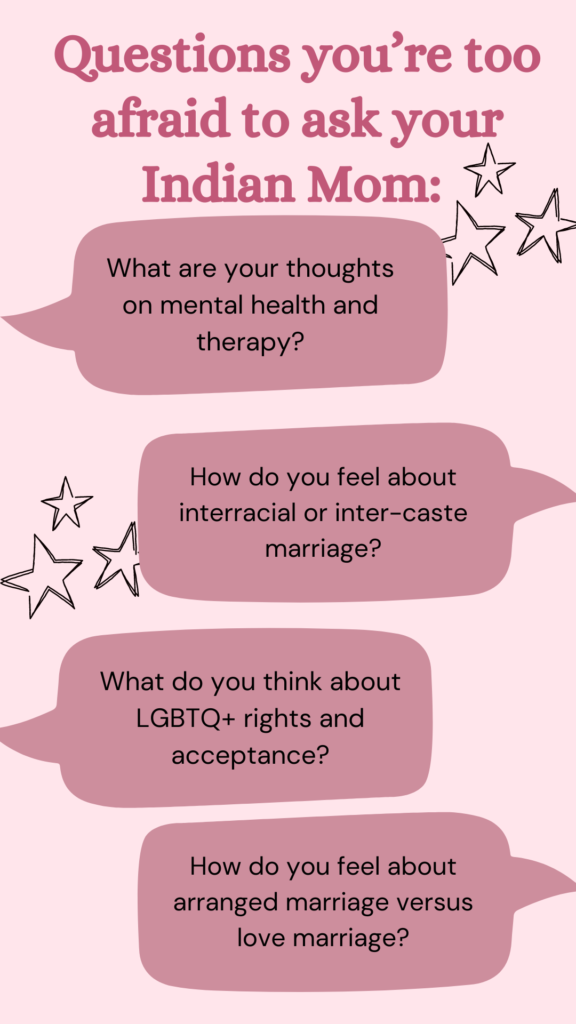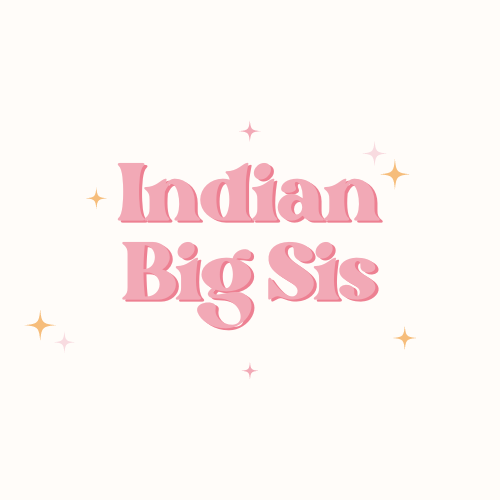
The relationship between a child and their Indian mother is a complex and often deeply meaningful one, shaped by cultural traditions, family values, and personal experiences. However, there may be times when difficult or taboo topics arise, leaving you unsure of how to approach the conversation. In this blog, we’ll explore some of the questions you may have wanted to ask your Indian mom but hesitated to bring up due to cultural norms or fear of offending her.
Asking taboo questions can be challenging, but it’s essential to open up conversations that foster understanding and connection. By tackling these topics head-on, you can create a stronger, more authentic relationship with your Indian mom based on mutual respect, honesty, and empathy. So, let’s dive into some of the questions you’ve always wanted to ask and discover how to approach them in a sensitive and respectful way.
- What are your thoughts on mental health and therapy?
By normalizing discussions about mental health and therapy, you can encourage your parents and other family members to seek help if needed. Openly discussing mental health and therapy can help reduce stigma within your family and wider community, making it easier for those who need help to access it without fear of judgment. This conversation can improve mutual understanding and empathy within your family, leading to stronger and more supportive relationships.
2. How do you feel about interracial or inter-caste marriage?
Addressing this topic early on can help prevent potential conflicts if you decide to pursue a relationship with someone outside your cultural or caste background. By discussing your parents’ views on interracial or inter-caste marriage, you can promote inclusivity within your family and challenge any biases that exist. Indian culture often emphasizes the importance of family and community, and interracial or inter-caste marriages can challenge these values. Understanding your parents’ perspective on these marriages can help you navigate their expectations.
3. What do you think about LGBTQ+ rights and acceptance?
In Indian culture, LGBTQ+ identities are often considered taboo, leading to stigma and discrimination. Addressing these issues with your parents can help challenge negative stereotypes and foster more accepting attitudes.By discussing LGBTQ+ rights and acceptance with your parents, you can advocate for change within your family and wider community, which can ultimately contribute to more inclusive policies and practices.
4. How do you feel about arranged marriage versus love marriage?
Discussing arranged marriage with your parents can help them understand your perspective on relationships and provide them with insight into American dating and marriage practices. If you don’t express your feelings on arranged marriage, your parents may assume you’re open to the idea and may become disappointed or upset if you don’t agree. Open communication can prevent these situations and help maintain a positive relationship with your parents.
5. What are your thoughts on gender roles and equality?
Gender roles and equality are complex and often controversial topics in Indian society. Understanding your mom’s perspective can provide insight into her beliefs and potentially challenge stereotypes or biases.
6. Have you ever experienced discrimination or racism?
By learning about your parents’ experiences with discrimination or racism, you can gain a deeper understanding of their perspective and the challenges they have faced. This can help you empathize with their struggles and support them better. Talking about discrimination and racism with your parents can promote awareness of these issues and help break down the silence that often surrounds them. This can contribute to greater understanding and awareness of racial and cultural diversity in your family and community.
7. How do you cope with grief and loss?
Grief and loss are universal human experiences, but they can be especially challenging to navigate in Indian culture. Discussing your mom’s experiences and coping mechanisms can provide support and understanding.
8. What do you think about spirituality and religion?
Spirituality and religion are central to many Indian families, but perspectives can vary widely. Asking your mom about her beliefs and practices can provide insight into her values and worldview.
9. How has your relationship with your own parents changed over time?
Understanding your mom’s relationship with her own parents can provide valuable context for your own relationship and help you navigate potential challenges or conflicts.
10. How do you feel about the pressure to have children?
The pressure to have children, is a common issue in Indian culture. Discussing your mom’s experiences and thoughts can help you understand her perspective and potentially challenge stereotypes or expectations.
11. What are your thoughts on divorce and remarriage?
Divorce and remarriage are often stigmatized topics in Indian culture. Asking your mom about her thoughts can help you understand her perspective and potentially challenge stereotypes or biases.
12. How do you feel about the role of extended family in our lives?
Extended family plays a significant role in many Indian families, but perspectives can vary widely. Discussing your mom’s thoughts can provide insight into her beliefs about family relationships and obligations.
13. What are your thoughts on the impact of social media and technology on our lives?
Social media and technology have transformed the way we communicate and interact, but they can also pose challenges. Understanding your mom’s perspective can provide insight into her thoughts on these issues.
14. How do you feel about body image and beauty standards in our culture?
Body image and beauty standards can be complex and often controversial topics in Indian culture. Discussing your mom’s experiences and thoughts can provide valuable context for your own beliefs and challenges.
15. What are your hopes for the future of our family?
Understanding your mom’s hopes and aspirations for the future can provide valuable insight into her dreams and goals for the family.
16. How do you deal with stress and anxiety in your own life?
Stress and anxiety are common issues in today’s fast-paced world, and understanding your mom’s coping mechanisms can provide valuable support and inspiration.
17. What are your thoughts on work-life balance and the role of women in the workforce?
Work-life balance and the role of women in the workforce are complex topics, especially in Indian culture. Discussing your mom’s experiences and thoughts can provide valuable insight into her beliefs and challenges.
18. How do you feel about the impact of cultural traditions on our family’s identity?
Cultural traditions play a significant role in shaping our identities and values. Discussing your mom’s thoughts on this topic can provide insight into her beliefs and experiences, and how they shape your family’s identity.
